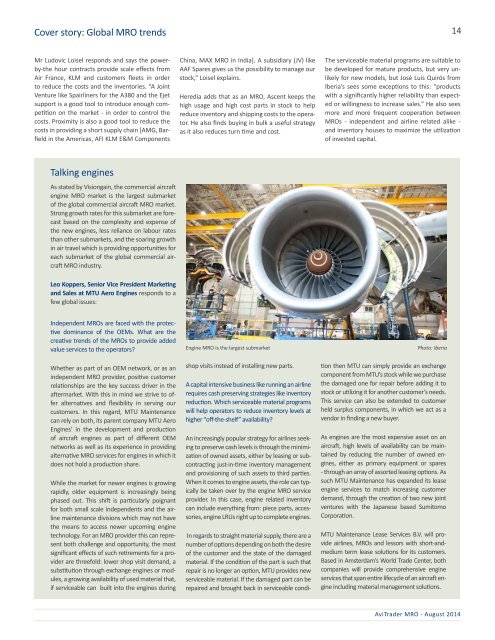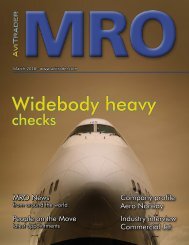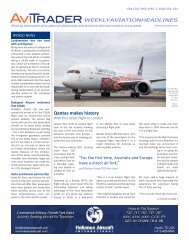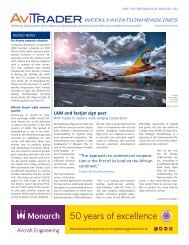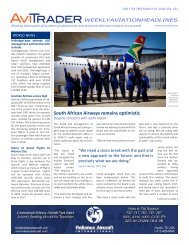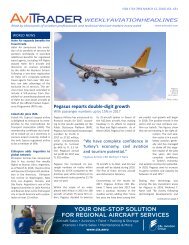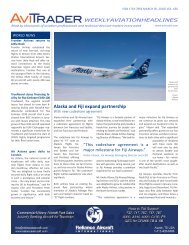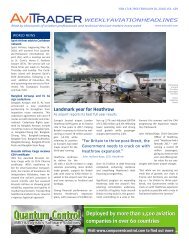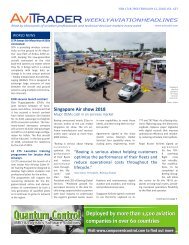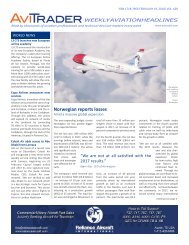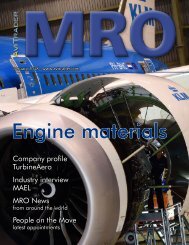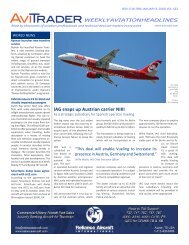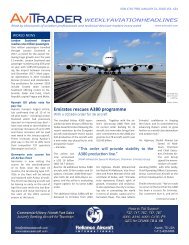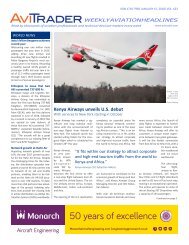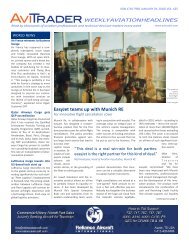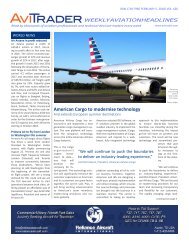AviTrader_Monthly_MRO_e-Magazine_2014-08
AviTrader_Monthly_MRO_e-Magazine_2014-08
AviTrader_Monthly_MRO_e-Magazine_2014-08
Create successful ePaper yourself
Turn your PDF publications into a flip-book with our unique Google optimized e-Paper software.
Cover story: Global <strong>MRO</strong> trends<br />
14<br />
Mr Ludovic Loisel responds and says the powerby-the<br />
hour contracts provide scale effects from<br />
Air France, KLM and customers fleets in order<br />
to reduce the costs and the inventories. “A Joint<br />
Venture like Spairliners for the A380 and the Ejet<br />
support is a good tool to introduce enough competition<br />
on the market - in order to control the<br />
costs. Proximity is also a good tool to reduce the<br />
costs in providing a short supply chain [AMG, Barfield<br />
in the Americas, AFI KLM E&M Components<br />
China, MAX <strong>MRO</strong> in India]. A subsidiary (JV) like<br />
AAF Spares gives us the possibility to manage our<br />
stock,” Loisel explains.<br />
Heredia adds that as an <strong>MRO</strong>, Ascent keeps the<br />
high usage and high cost parts in stock to help<br />
reduce inventory and shipping costs to the operator.<br />
He also finds buying in bulk a useful strategy<br />
as it also reduces turn time and cost.<br />
The serviceable material programs are suitable to<br />
be developed for mature products, but very unlikely<br />
for new models, but José Luis Quirós from<br />
Iberia’s sees some exceptions to this: “products<br />
with a significantly higher reliability than expected<br />
or willingness to increase sales.” He also sees<br />
more and more frequent cooperation between<br />
<strong>MRO</strong>s - independent and airline related alike -<br />
and inventory houses to maximize the utilization<br />
of invested capital.<br />
Talking engines<br />
As stated by Visiongain, the commercial aircraft<br />
engine <strong>MRO</strong> market is the largest submarket<br />
of the global commercial aircraft <strong>MRO</strong> market.<br />
Strong growth rates for this submarket are forecast<br />
based on the complexity and expense of<br />
the new engines, less reliance on labour rates<br />
than other submarkets, and the soaring growth<br />
in air travel which is providing opportunities for<br />
each submarket of the global commercial aircraft<br />
<strong>MRO</strong> industry.<br />
Leo Koppers, Senior Vice President Marketing<br />
and Sales at MTU Aero Engines responds to a<br />
few global issues:<br />
Independent <strong>MRO</strong>s are faced with the protective<br />
dominance of the OEMs. What are the<br />
creative trends of the <strong>MRO</strong>s to provide added<br />
value services to the operators?<br />
Whether as part of an OEM network, or as an<br />
independent <strong>MRO</strong> provider, positive customer<br />
relationships are the key success driver in the<br />
aftermarket. With this in mind we strive to offer<br />
alternatives and flexibility in serving our<br />
customers. In this regard, MTU Maintenance<br />
can rely on both, its parent company MTU Aero<br />
Engines’ in the development and production<br />
of aircraft engines as part of different OEM<br />
networks as well as its experience in providing<br />
alternative <strong>MRO</strong> services for engines in which it<br />
does not hold a production share.<br />
While the market for newer engines is growing<br />
rapidly, older equipment is increasingly being<br />
phased out. This shift is particularly poignant<br />
for both small scale independents and the airline<br />
maintenance divisions which may not have<br />
the means to access newer upcoming engine<br />
technology. For an <strong>MRO</strong> provider this can represent<br />
both challenge and opportunity, the most<br />
significant effects of such retirements for a provider<br />
are threefold: lower shop visit demand, a<br />
substitution through exchange engines or modules,<br />
a growing availability of used material that,<br />
if serviceable can built into the engines during<br />
Engine <strong>MRO</strong> is the largest submarket<br />
shop visits instead of installing new parts.<br />
A capital intensive business like running an airline<br />
requires cash preserving strategies like inventory<br />
reduction. Which serviceable material programs<br />
will help operators to reduce inventory levels at<br />
higher “off-the-shelf” availability?<br />
An increasingly popular strategy for airlines seeking<br />
to preserve cash levels is through the minimization<br />
of owned assets, either by leasing or subcontracting<br />
just-in-time inventory management<br />
and provisioning of such assets to third parties.<br />
When it comes to engine assets, the role can typically<br />
be taken over by the engine <strong>MRO</strong> service<br />
provider. In this case, engine related inventory<br />
can include everything from: piece parts, accessories,<br />
engine LRUs right up to complete engines.<br />
Photo: Iberia<br />
In regards to straight material supply, there are a<br />
number of options depending on both the desire<br />
of the customer and the state of the damaged<br />
material. If the condition of the part is such that<br />
repair is no longer an option, MTU provides new<br />
serviceable material. If the damaged part can be<br />
repaired and brought back in serviceable condition<br />
then MTU can simply provide an exchange<br />
component from MTU’s stock while we purchase<br />
the damaged one for repair before adding it to<br />
stock or utilizing it for another customer’s needs.<br />
This service can also be extended to customer<br />
held surplus components, in which we act as a<br />
vendor in finding a new buyer.<br />
As engines are the most expensive asset on an<br />
aircraft, high levels of availability can be maintained<br />
by reducing the number of owned engines,<br />
either as primary equipment or spares<br />
- through an array of assorted leasing options. As<br />
such MTU Maintenance has expanded its lease<br />
engine services to match increasing customer<br />
demand, through the creation of two new joint<br />
ventures with the Japanese based Sumitomo<br />
Corporation.<br />
MTU Maintenance Lease Services B.V. will provide<br />
airlines, <strong>MRO</strong>s and lessors with short-andmedium<br />
term lease solutions for its customers.<br />
Based in Amsterdam’s World Trade Center, both<br />
companies will provide comprehensive engine<br />
services that span entire lifecycle of an aircraft engine<br />
including material management solutions.<br />
<strong>AviTrader</strong> <strong>MRO</strong> - August <strong>2014</strong>


